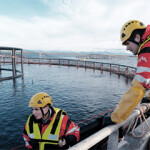Turning up the volume on worker voice: A Thai Union case study

Last month, Apple announced it would be phasing out its digital music marketplace iTunes – a decision that surprised Darian McBain, the global director of sustainable development for Thai Union Group, one of the world’s most prominent seafood suppliers.
Reading an article about the twilight of iTunes as she arrived in Bangkok, Thailand for the 2019 SeaWeb Seafood Summit (SWSS19) – taking place 10 to 14 June – an analogy formed for McBain between the evolution of music portability and the evolution of worker voice in the technologies and programs trialed by Thai Union in recent years.
McBain, presenting at SWSS19, referenced Thai Union’s work with Mars Petcare, Inmarsat, Thailand’s Department of Fisheries, and others in 2016 and 2017, when the parties launched a digital traceability pilot program that involved outfitting Thai fishing vessels with One Fleet terminals to encourage real-time connectivity between land and sea. As fast as vinyl records evolved into tapes, CDs, and MP3s, so too did the scope of the pilot and Thai Union’s thought-process surrounding it, McBain recalled.
Thai Union and its partners were training workers to use “Fish Talk” chat applications developed by Xsense in response to new regulation from the Thai government, which required Thai vessel owners operating outside of national waters to provide a satellite communication system and device onboard for workers at sea. That’s when the evolution began, McBain said.
“First of all, we said to [workers], ‘Who do you really want to connect to?’ And this was really an evolution in our thinking, because at first we thought, they’re going to want to talk an NGO or they want to talk to the Thai government,” she said.
“Overwhelmingly, they said, ‘We want to speak to our families – we’re going out to sea for weeks at a time; we want to know what’s happening at home.’ So we brought their families in, and each fisher had someone to connect to using Fish Talk. We trained them in multiple languages on how to use it, so part of the trial was that, at least twice a week, everybody had to communicate back to their person on land,” she added.
Just like that, McBain said, the trial transformed into a precedent-setting endeavor mingling technology with worker voice.
“It was really evolutionary, that these people could connect back to land. And of course, if there was some kind of human rights violation, they would – through their family – be able to raise an alarm. Now I say this about evolution, because the trial didn’t start out being about worker voice. But the most successful thing about the trial was that, for the first time in Thailand, the workers at sea actually had a voice,” McBain said. “When you’re looking at the evolution, I think you have to accept that we don’t have the answers yet. We don’t know what the end point is, but we absolutely have to start these trials, give workers a voice, and see what they’re going to do with it."
The similarities between how the Fish Talk pilot transformed and how music sharing in broader society has transformed were hard to ignore for McBain.
“Last night, I was reading an article where Apple has said it’s killing iTunes,” she said. “iTunes revolutionized the music industry – go back 30 years ago, you had a record. Then a revolution happened in the 1980’s, and you had a CD, you digitized music. Then, in the 1990’s, you had another revolution – you had MP3s, there was a way you could compress a music file. Then that evolved, and there was illegal activity happening, you had Napster and everyone was ripping music all over the place – I think I read that it’s ‘the great celestial jukebox in the sky.’ Then Apple saw the opportunity to commercialize it, and they brought in iTunes, so you could legally get it, but actually you had to pay for it, and Apple made a fortune out of that. But now, iTunes is a bit passé – who hasn’t got Spotify or Pandora?”
“I think when you’re looking at worker voice, we’re somewhere on that spectrum,” McBain posited. “I’d like to think our trial – it’s not a Spotify, we’re not there yet – is a little bit beyond a CD, but not quite a Napster, because it was legal. We don’t know what the end point is, but if we keep worker voice in mind, if you keep the perspective of what you’re trying to achieve, then I think that way – working together – we can achieve some outcomes and definitely set off in the right direction.”
McBain, who has spearheaded Thai Union’s commitments and pledges on global platforms, such as the United Nations and World Economic Forum, and has worked diligently implementing the company's corporate sustainability program SeaChange, was presented with the Seafood Champion Award for Vision during the summit.






Share